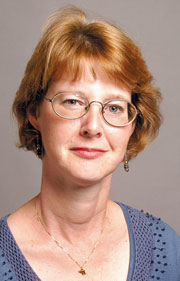 The Reform movement and the Central Conference of American Rabbis is piloting a new High Holiday machzor (prayer book) and Temple Beth Sholom in Topeka is one of about 70 congregations that used the new Kol Nidre service last week. No other congregation in the Kansas City area participated in the pilot.
The Reform movement and the Central Conference of American Rabbis is piloting a new High Holiday machzor (prayer book) and Temple Beth Sholom in Topeka is one of about 70 congregations that used the new Kol Nidre service last week. No other congregation in the Kansas City area participated in the pilot.
Rabbi Debbie Stiel said this is the first major rewriting the Reform movement has done on its High Holiday prayer book in more than 100 years. The rabbi of the 110-member congregation believes it was time for the Reform movement to revise its High Holiday machzor.
“I’m grateful that this congregation wanted to give this a try,” she said.
One of the rabbis responsible for the new machzor is Rabbi Edwin Goldberg, a Kansas City native who is senior rabbi at Temple Judea in Coral Gables, Fla. As he notes in Beth Sholom’s monthly newsletter, “The Gates of Repentance,” has been the Reform movement’s main prayer book since 1978. He continued that while it had some new readings and prayers in it, “the Reform movement hasn’t put a machzor together from scratch since 1894, just revisions.”
Rabbi Stiel said she believes her congregation enjoyed the revisions.
“I think it went pretty well. Anytime you use a new prayer book there’s a certain learning curve and with this one there were so many options it was a little hard to judge how much to put in and how much to leave out,” she said.
According to the committee putting together the new machzor, this new book is expected to be the Reform movement’s indispensable manual and guide for the High Holy Days.
“We aim to create a machzor that will serve Reform Jews as they seek repentance, new direction and a sense of return to God and the Jewish people,” notes the committee in the machzor’s vision statement.
Like “Mishkan T’fillah,” the Reform machzor that debuted a few years ago for Shabbat and weekday services, this machzor is largely gender neutral and provides both traditional prayers and optional, contemporary exploration of the traditional themes.
“People seemed to really like the options and the gender-neutral language. Most of the responses we’ve gotten have been very positive,” Rabbi Stiel said.
This is the second year congregations across the country have been testing different services in the new book. Another portion of the book will be tested next year.
Several members of Beth Sholom’s Religious Services Committee saw the draft of the Kol Nidre service before it was used. Since the draft includes several options, much like “Mishkan T’fillah,” some members of this committee presented the rabbi with feedback even before the book was used at worship.
In her monthly message to members via the temple newsletter, Rabbi Stiel urged congregants to keep an open mind about the new prayer book during the service.
“Anytime we change something that becomes as standard and familiar to us as our prayer book, it takes time to adjust to it. Lots of the prayers we will say on erev Yom Kippur will be the same ones we have always said. But in some instances we will try the more interpretive options. I hope the new words will add meaningful new insights for all of us. Once again we Jews will be taking what is foundational in our faith and adding our layer to it. I look forward to hearing your thoughts on it,” she wrote.
The rabbi, who pointed out that the congregation’s participation in this pilot was covered by the Topeka Capital Journal newspaper, said she personally liked many of the alternative reading selections, contemporary and traditional prayers and gender sensitive translations.
“There were some nice study pieces about forgiveness,” she said. “There is also some really nice poetry and different meditation pieces that reflected on a whole range of themes, but they were great for thinking about for the High Holy Days.”
The only thing she really did not like was the translation of the Kol Nidre.
“In the Reform movement’s current machzor, ‘Gates of Repentance,’ the translation for Kol Nidre says ‘let all our vows and oaths … we incur to You, O God, between this Yom Kippur and the next, be null and void should we, after honest effort, find ourselves unable to fulfill them.’ The current draft machzor says “All vows … which we promise and swear to God … let all of them be discarded and forgiven. …” Nowhere in this new translation does it say anything about us trying first to keep our promises before discarding them. That struck me and others as a serious omission. So I hope that will change by the time the CCAR creates its permanent new machzor.
Rabbis and members of congregations who piloted the service, including some from Temple Beth Sholom, will give feedback to the committee regarding the service. Rabbi Stiel was scheduled to participate in a focus group conference call about the machzor earlier this week.
Rabbi Stiel said she believes the pilot service will be used at the temple again next year.
“We own these draft copies now so we will probably use them again next year, since people seemed to like them. Maybe we’ll pick some different selections from the book.”


